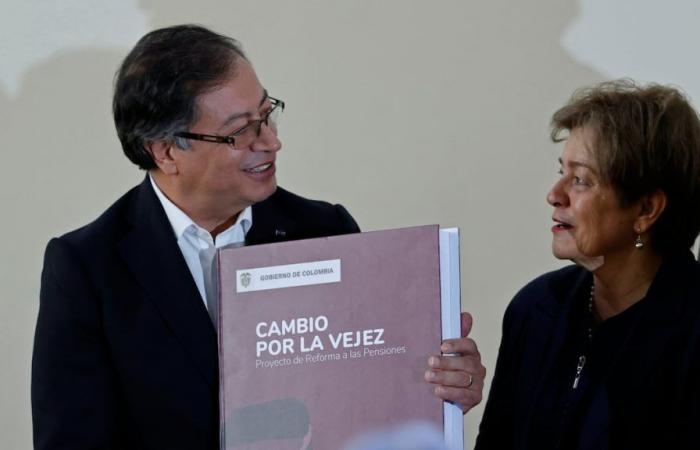President Gustavo Petro has just achieved his first major legislative victory of 2024. The Colombian Congress approved his pension reform this Friday afternoon. The majority of the House of Representatives voted to accept the text of the bill as it came from the Senate. There was no room for debate or for the modifications proposed by the representatives. This decision, which annuls the changes agreed upon in the Seventh Commission of the House of Representatives, was achieved thanks to a proposal signed by congressmen from the Historical Pact, the governing party, and some allies.
In the end, the reform that will fundamentally transform the retirement system for millions of Colombians obtained a simple majority, with 86 votes for yes and 32 for no. In addition to the Historical Pact, the reform passed with the support of the Comunes party and congressmen from the Green, U, Liberal and Conservative parties. According to those who signed the proposal, it was the only way for the reform not to sink due to the limited time it had left. Many were afraid that the president of the Senate, Iván Name, Petro’s opponent, would not call for a necessary conciliation of the texts if they were different, which had to be completed no later than June 20. The project, which will strengthen the public pension fund and change the current system for one with four pillars, will come into effect in July 2025. The project seeks for all citizens to contribute up to 2.3 salaries to a public fund, and from there they save in private funds, which would free up public resources to provide assistance to older adults without a pension.
Amid applause and shouts of “If it was possible,” Representative Martha Afonso, of the Green Party, rapporteur of the bill, celebrated the approval of the reform, and explained the reasons for not debating in the Chamber: “It was either this or nothing,” Afonso said. “Those of us who came to defend the most vulnerable have to put the interests of the people above all. It is a reform that the pension system needs because it is in crisis, it is unsustainable. Here the humble people are winning, the millions of older adults who do not have a pension.”
Many representatives criticized the decision not to debate the articles in the House. “He has just turned Congress into a unicameral corporation,” said Andrés Forero, of the opposition Democratic Center. “Without disgust they classify a block of 95 articles. We will go to the Constitutional Court in the face of such arbitrariness.” Representative Juan Carlos Losada, of the Liberal Party, also expressed his rejection: Today is one of the saddest days I have ever seen in the Congress of the Republic! I never imagined that the first left-wing government would ignore democracy, bicameralism and deliberation as right-wing governments did so many times. How awful! They approve the pension reform without any discussion! But also doing unpresentable favors to private funds that today will earn twice as much as before! The complete opposite of what they sold! Shame!
Today in Colombia two pension systems coexist, with different rules. In one, you contribute to a public fund and the amount of the pension is an average of the last years of contributions, which implies a state subsidy to reach that figure. In another, the person sends his savings to a private fund, where he has an individual account, and retires from everything he has saved. The result is confusion and few pensions: 3 out of 4 people of retirement age do not have a pension. The Government’s proposal is that everyone contribute to the public fund up to a certain limit, and from there save in private funds, which clarifies the scheme and frees up public resources to provide assistance to older adults without a pension.
Newsletter
The analysis of current events and the best stories from Colombia, every week in your mailbox
RECEIVE THE
The reform eliminates the competition between Colpensiones and private funds, which also have different rules for accessing the pension and defining its amount. Now, the two regimes complement each other in a single system, as happens in other countries in the world. To achieve this objective, the new old-age protection system is divided into fourth pillars.
Solidarity pillar: seeks to provide a monetary transfer to vulnerable older adults, who were unable to contribute and are in poverty. It has no relationship with Colpensiones or private funds.
Semi-contributory pillar: it is aimed at people who are informal and who do not meet the requirements to access a pension, but have contributed at times. Those in this pillar will be given, through a life annuity, the money they have saved plus a state subsidy, 20% in the case of men and 30% in the case of women.
Contributory pillar: this group will include those who contribute stably towards their pension. With the reform, the contributions they make for income of up to 2.3 minimum wages, more or less 2.9 million pesos, will go to Colpensiones, and the rest will go to the private fund they choose. When they retire, they will have a pension from the public system, with a state subsidy, only for that first tranche, and the remainder under the rules of the game of private funds.
Voluntary Pillar: People with the ability to pay may make an additional contribution, to guarantee a better pension for their old age in the future.
*News in development
Subscribe here to the EL PAÍS newsletter about Colombia and here to the channel on WhatsAppand receive all the information keys on current events in the country.






